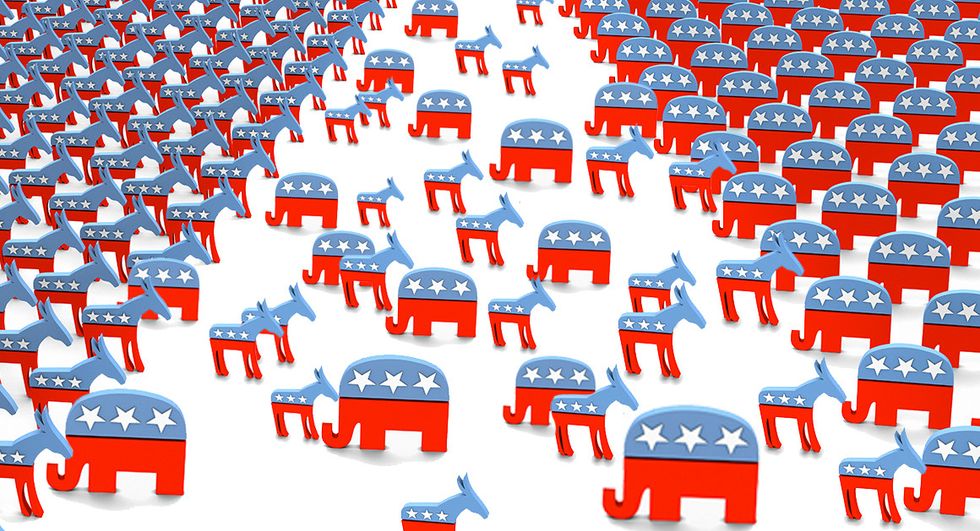Conservatives are big on borders, no surprise there. What’s surprising, however, is that the idea reaches farther than merely the physical domain.
Conceptually, conservatives like borders around ideas because new ideas can disrupt a stable system. Looking back at the 20th century, the various revolutions, communist and fascist alike, were catastrophic in the final analysis. Tens, if not hundreds of millions of people died as a result of internal oppression alone – not to mention the countless others who perished during the revolutionary wars themselves. Yet, here in the West we have generated more wealth, lifted more people out of poverty, and allowed for the maximization of human flourishing to a greater degree than ever before. Thus, conceptually, it is reasonable for conservatives to be wary of new ideas. If we hadn’t been, who knows whether or not America would’ve fallen to the same temptations as the Soviets, Nazis, Maoists and other collectivist utopian types of the last century?
Proximally, it is also reasonable for conservatives to be wary of new people. Within a hundred years from the time the first Europeans landed in North America, more than 90% of the native population was killed by disease – smallpox was a novel virus which they had never had exposure to, and thus no immunity for. The Black Death that ravaged Europe in the 14th century is thought to have originated in the dry plains of Central Asia where it then travelled along the Silk Road. From there, it was most likely carried by Oriental rat fleas living on the black rats that were regular passengers on merchant ships, spreading throughout the Mediterranean and Europe. The resulting epidemic killed off somewhere between 30-60% of Europe’s total population. Is it any wonder why conservatives care so much about immigration? (Note: I am not saying Mexican immigrants will start the next pandemic, but we need to seriously consider the reasons why people are hesitant of the idea of open borders if we want to have a serious discussion moving forward).
Liberals emphasize openness, conceptually and proximally, for reasons that can also be explained by looking at history. Conceptually, thickening of the borders can lead to instability within a system if new ideas are not taken into consideration. When a current schema fails to account for new information, societies and individuals alike can be caught off guard when disruptions of that current schema occur. New ideas, although sometimes destabilizing, can benefit a system if it becomes too old, firm, and corrupt – culture is dead, something generated and passed down from dead people, and dead things by definition can’t address novelty properly. Thus it can be said that liberals are correct, within a specific context, when they push for the introduction of new ideas that seek to address issues the current system isn’t dealing with properly. In the aftermath of the 2008 financial crisis, the “Occupy” movement was a response to the perceived insufficiencies of the current economic system – and of course, they had a point. From the outside it appears to me that working class people were disproportionately affected while the perpetrators on Wall Street were bailed out, almost as if they were rewarded for their criminality. Whether or not this was the fault of our capitalist system can be debated, but it is clear, from the perspective of a layman, why this idea garnered attention.
Proximally, liberals advocate for open borders for similar reasons. New people may have something to offer – whether it be in the form of new ideas or new products. When the West ‘discovered’ the East, trade ensued, and people from across the world were suddenly made aware of new products they never would’ve known about otherwise. Trade between people and nations also strengthen relations – as the saying goes, you are less likely to go to war with people whom you trade with. This is why democrats initially pushed for the proliferation of international trade agreements.
As far as I can tell, the fundamental difference between liberal and conservatives types comes down to this: liberals are tilted towards interest in the novel, while conservatives are tilted towards a respect for order. Liberals are more likely to recognize problems with the current system and seek new ways of dealing with them; while conservatives are more likely to recognize the grandeur of tradition and thus shy away from implementing any radical, and potentially destabilizing changes. This is why conservatives lose their minds when they see people burning the flag: they see a lack of respect for the ancestral wisdom we’ve inherited; but liberals have a point as well – when a system has become old, infirm, willfully blind, and corrupt, a show of disapproval (in the form of a flag burning) may be warranted.



















